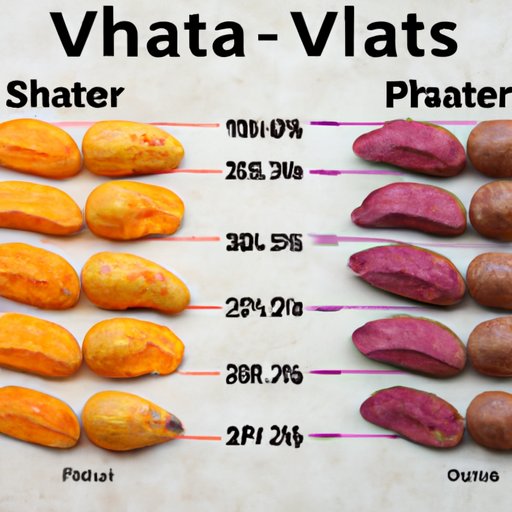Introduction
Sweet potatoes are a popular root vegetable that are widely consumed around the world. They are often compared with regular potatoes, but what makes them different nutritionally? In this article, we explore why sweet potatoes are considered to be healthier than regular potatoes and how they can be incorporated into your diet for improved health and weight management.

Nutritional Profile Comparison between Sweet Potatoes and Regular Potatoes
When comparing sweet potatoes and regular potatoes, the most notable difference is their nutritional profile. Sweet potatoes are higher in calories and carbs, but they are also much higher in vitamins and minerals. Let’s take a closer look at the macronutrient content of each type of potato:
Regular potatoes contain 110 calories per serving, while sweet potatoes contain 180 calories. Regular potatoes are comprised of 24 grams of carbs, 2 grams of protein, and 0.3 grams of fat. Sweet potatoes, on the other hand, contain 42 grams of carbs, 4 grams of protein, and 0.2 grams of fat.
In terms of vitamins and minerals, sweet potatoes are much higher in nutrients than regular potatoes. They contain four times more vitamin A, twice as much vitamin C, and three times more potassium. Sweet potatoes are also higher in calcium, iron, magnesium, and phosphorus than regular potatoes.
The glycemic index (GI) measures how quickly foods cause your blood sugar levels to rise. The lower the GI, the slower the rate of digestion and absorption of the food. Sweet potatoes have a GI of 44, which is considerably lower than regular potatoes, which have a GI of 85.

Overview of the Health Benefits of Sweet Potatoes
Given their higher nutrient content and lower GI, sweet potatoes offer a variety of health benefits. Here are some of the key ways that sweet potatoes can improve your health:
Improved Digestive Health – Sweet potatoes are high in dietary fiber, which helps to promote healthy digestion. Fiber helps to regulate how food moves through the digestive tract, which can reduce the risk of constipation and other digestive issues.
Increased Energy Levels – Sweet potatoes are high in complex carbohydrates, which are slowly digested and absorbed into the body. This helps to maintain steady energy levels throughout the day without the crash caused by simple carbohydrates.
Reduced Risk of Cancer – Sweet potatoes are high in antioxidants, which can help to reduce inflammation and protect against oxidative stress. This can reduce the risk of certain types of cancer, such as colon cancer.
Improved Eye Health – Sweet potatoes are rich in carotenoids, which are compounds that are converted into vitamin A in the body. Vitamin A is essential for maintaining healthy vision.
How to Incorporate Sweet Potatoes into Your Diet
Sweet potatoes can easily be incorporated into your diet. Here are some ideas for adding sweet potatoes to your meals:
Adding Sweet Potatoes to Your Meals – Sweet potatoes can be added to almost any meal to boost the nutritional value. Try adding them to soups, stews, casseroles, or stir-fries. You can also use them as an ingredient in omelets, pancakes, and muffins.
Replacing Regular Potatoes with Sweet Potatoes – You can replace regular potatoes with sweet potatoes in recipes like mashed potatoes or French fries. Sweet potatoes are also great for baking, so you can use them in cakes, breads, and cookies.
Using Sweet Potatoes as a Side Dish – Sweet potatoes can make a delicious side dish. You can bake, boil, or roast them and top with herbs, spices, or cheese. You can also make sweet potato fries or chips for a tasty snack.
Different Types of Sweet Potatoes and Their Nutritional Benefits
There are several different varieties of sweet potatoes, each with its own unique flavor and nutritional profile. Here is a quick overview of some of the most popular types of sweet potatoes and their nutritional value:
Purple Sweet Potatoes – Purple sweet potatoes are high in anthocyanins, which are powerful antioxidants that can help reduce inflammation and protect against oxidative damage. They are also high in fiber, vitamin C, and beta carotene.
Orange Sweet Potatoes – Orange sweet potatoes are high in beta carotene, which is converted into vitamin A in the body. They are also high in fiber, vitamin C, and potassium.
White Sweet Potatoes – White sweet potatoes are high in fiber, vitamin C, and potassium. They are also high in antioxidants, which can help to reduce inflammation and protect against oxidative damage.
Discussing the Importance of Consuming Complex Carbohydrates
Complex carbohydrates are important for maintaining good health. They are slowly digested and absorbed into the body, which helps to maintain steady energy levels throughout the day. They are also high in fiber, which helps to promote healthy digestion. Furthermore, complex carbohydrates are lower on the glycemic index, which can help to prevent spikes in blood sugar levels.

Exploring the Role of Sweet Potatoes in Traditional Cuisines Around the World
Sweet potatoes are popular in traditional cuisines around the world. Here is a brief overview of how sweet potatoes are used in African, South American, and Asian cuisine:
Sweet Potatoes in African Cuisine – Sweet potatoes are commonly used in African cuisine. They are boiled, mashed, or roasted and served as a side dish. They are also used in soups, stews, and porridges.
Sweet Potatoes in South American Cuisine – Sweet potatoes are a staple in South American cuisine. They are boiled, mashed, or fried and served as a side dish. They are also used in soups, stews, casseroles, and desserts.
Sweet Potatoes in Asian Cuisine – Sweet potatoes are widely used in Asian cuisine. They are boiled, steamed, or deep-fried and served as a side dish. They are also used in soups, stir-fries, and curries.

Examining the Impact of Sweet Potatoes on Weight Management
Sweet potatoes can be beneficial for weight management. They are low in calories and high in fiber, which can help to keep you feeling full for longer. Sweet potatoes also have a low GI, which means they digest more slowly and release glucose into the bloodstream at a steady rate.
Conclusion
Sweet potatoes are a nutritious and versatile food that can be incorporated into a variety of dishes. They are higher in vitamins and minerals than regular potatoes and have a lower GI, which can help to reduce spikes in blood sugar levels. Sweet potatoes also contain fiber and complex carbohydrates, which can help to promote healthy digestion and maintain steady energy levels. Finally, sweet potatoes are low in calories and high in fiber, which can aid in weight management.
In conclusion, sweet potatoes are a healthier alternative to regular potatoes and can be easily incorporated into your diet for improved health and weight management.
(Note: Is this article not meeting your expectations? Do you have knowledge or insights to share? Unlock new opportunities and expand your reach by joining our authors team. Click Registration to join us and share your expertise with our readers.)
